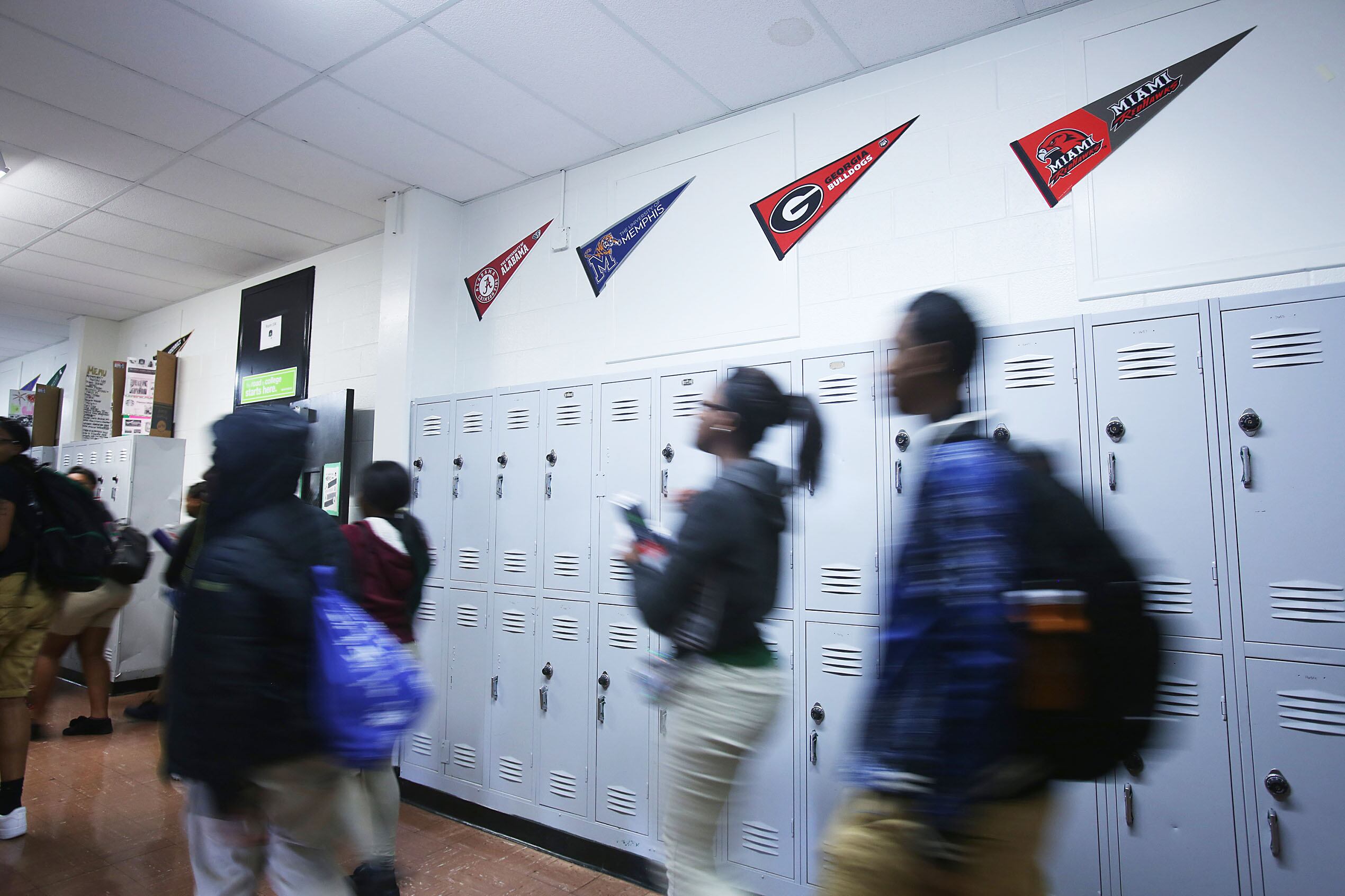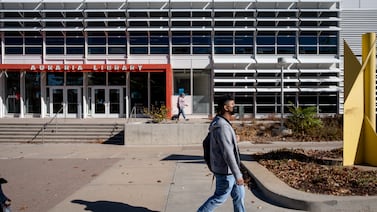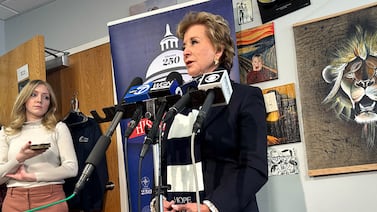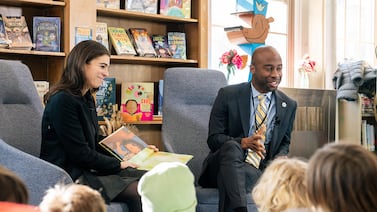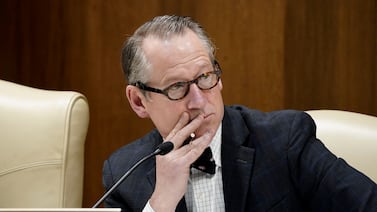Now that the latest COVID surge is ebbing and schools have reopened, many Newark students are feeling better. But better isn’t the same as normal.
At East Side High School, students were eager to return to their classrooms last week, said Ava McLeod, a school social worker. But they still have plenty to worry about, from navigating social interactions and COVID restrictions in school to coping with ongoing pandemic hardships at home.
“We’ve seen a lot of students just struggling with everyday life,” McLeod said, including loved ones getting sick, parents losing jobs, and families struggling to pay rent and heating bills. “Some students are suffering.”
Already on the rise before COVID, mental health problems among young people have spiked during the pandemic. In October, a group of children’s health experts declared a national emergency in youth mental health.
“We are caring for young people with soaring rates of depression, anxiety, trauma, loneliness, and suicidality that will have lasting impacts on them, their families, and their communities,” they wrote.
Newark educators are reporting similar mental health challenges among students. In an interview on the show “All Politics R Local,” Superintendent Roger León said “students are exhibiting behaviors unlike ever before,” which he called a matter “of great concern.”
New Jersey’s largest school district, Newark is marshaling resources to respond to the crisis. Last month, León said, he created a districtwide mental health task force. Each school will come up with a mental health action plan, and appoint a staffer to coordinate the work, he added.
The district also plans to hire more mental health professionals, León said. “There’s a need that will require us to really reallocate some funds, open up some new positions, and definitely have school counselors and social workers hired to assist us.”
At East Side, staffers are using whatever resources they have to promote mental wellness.
Each school day begins with two minutes of guided meditation and deep breathing led by a staff member over the school intercom, McLeon said. The school offers yoga workshops and individual counseling, and staffers meet weekly to discuss interventions for students who need extra support.
“Mentally, I think everyone’s tired,” McLeod said, referring to staff and students. But, “at the end of the day, we’re still smiling.”
While the district looks to ramp up its mental health staffing, it has turned to external partners to fill in gaps. Partner organizations have long provided services in Newark schools, but they have become a critical lifeline as COVID creates severe staff shortages.
Universities, nonprofits, and private companies provide various mental health-related services ranging from staff training to online programs to student counseling. Much of the work is funded by federal or private grants.
A Newark Public Schools spokesperson did not respond to a request for information, so Chalkbeat examined service agreements and contacted providers to get a fuller picture of the mental health support offered by outside groups.
Below are some of the programs.
A pipeline of school psychologists
Graduate students are helping fill the need for more school psychologists in Newark.
Each week, trainees in the school psychology program at Fairleigh Dickinson University provide counseling to students at four Newark schools. The partnership, called Supportive Schools Newark, is funded by a five-year, $1.9 million grant that the U.S. Education Department awarded Newark Public Schools and FDU in 2019.
The program’s purpose is twofold: Expand the district’s capacity to support students who have experienced trauma, and create a pipeline of incoming school psychologists trained to work in high-needs schools.
Newark school staffers refer students to the program who might need mental health support, said Dr. Linda Raffaele Mendez, an associate professor at FDU who helps oversee the program. After obtaining parental consent, the graduate students create treatment plans for the participating students, then provide 30-45 minutes per week of individual counseling.
As of December, 35 students had been selected to receive counseling at the participating elementary schools: Oliver Street, Elliott Street, Lincoln, and Park.
Support for grieving students
Nationwide, an estimated 1 in every 450 young people lost a parent or caregiver to COVID. The rate could be even higher in Newark, where COVID caused a disproportionate number of deaths.
The district is helping students deal with their grief through a partnership with Rainbows for All Children, a nonprofit that trains adults to lead support groups for children coping with the absence of a family member due to death, incarceration, deportation, and, now, the pandemic.
“Newark is one of a handful of school districts in the U.S. that trained a number of school personnel” on leading grief-support groups, said Laura Lindroth, Rainbows’ director of programming and community engagement.
The group has trained 110 employees at nearly 60 Newark schools to date.
Breaking the ‘cycle of violence’
When classrooms reopened this fall, educators nationwide reported an uptick in disruptive behaviors. In Newark, some schools grappled with violence that predated the pandemic.
Newark Public Schools has partnered with Rutgers University to address the root causes of behavior problems and violence. Funded by a five-year, $4.6 million federal grant, “Project Prevent Newark” aims to help students “deal with trauma and break the cycle of violence prevalent” in some communities.
Rutgers’ mental health clinicians offer individual and group counseling to high-risk students, said Sonia Rodrigues-Marto, director of school-based programs at Rutgers University Behavioral Health Care. They also provide family therapy, offer evening workshops for parents and school staffers, and help teachers respond to classroom behavior challenges.
“Our goal is to provide support to students who would not normally receive therapeutic services outside of school,” Rodrigues-Marto said in an email.
Her team currently is working in six district schools.
Skills for success
Students need more than English and math smarts to succeed in school.
They also must be able to control their impulses, manage their emotions, work collaboratively, and resolve conflicts peacefully. Schools nationwide have become increasingly interested in teaching students those skills, in what is typically called social-emotional learning, or SEL.
The Newark Trust for Education, a nonprofit that provides technical support and distributes philanthropic money to schools, is funding SEL work at Belmont Runyon, Franklin, John F. Kennedy, and several other district schools. The work includes teaching students social-emotional skills, training staff, and tracking student behaviors.
The trust is also funding other mental health-related projects. Science Park High School students will receive emotional support from coaches via text message, and students at Dr. William H. Horton School will participate in group counseling provided by the Youth Development Clinic.
Building relationships
Young people benefit from having a caring adult who checks in regularly, listens to their concerns, and offers encouragement — in other words, a mentor.
Newark Public Schools has brought in MENTOR Newark to help launch mentoring programs in every high school. The group will train at least one staff member in each school to serve as program coordinator, said Executive Director Thomas Owens. His organization will also help recruit and train the mentors, who could be school employees, community members, or corporate volunteers.
Because COVID restrictions have limited access to schools, Owens’ group launched an app that lets mentors and students connect digitally.
“Sometimes it doesn’t take much more than a text,” Owens said. “‘Are you good? Do you need anything?’”

